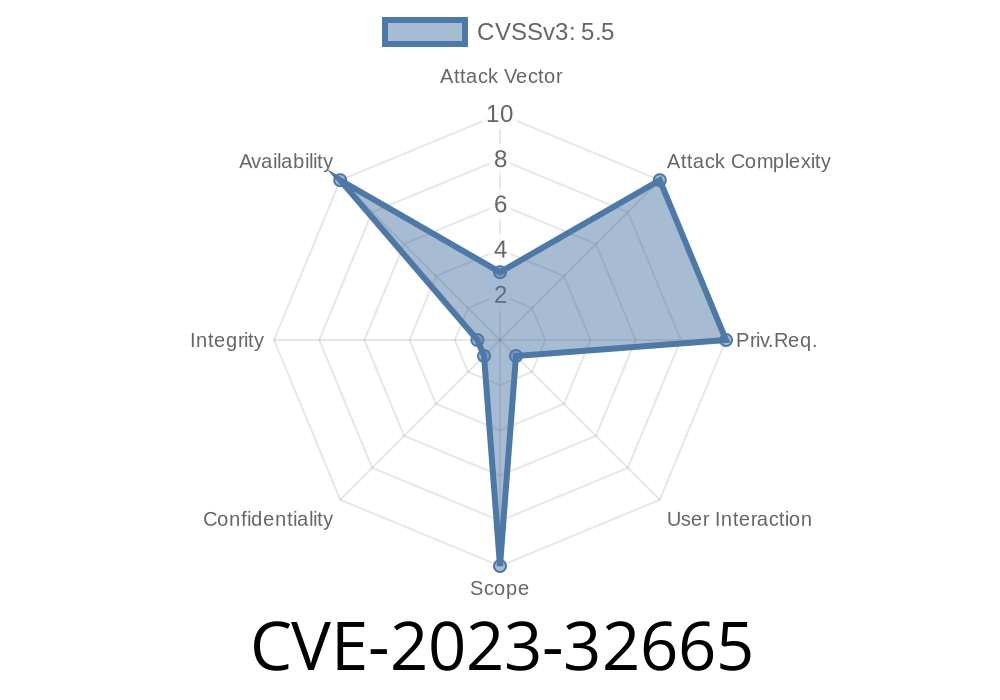A serious security flaw tagged as CVE-2023-32665 was discovered in GLib, the core library used by thousands of Linux applications and desktop environments like GNOME. This flaw is linked to the way GLib handles _GVariant_ deserialization and can easily lead to a Denial of Service (DoS), potentially freezing or crashing important software.
Let's break down what this means in plain language, how it works, explore a code sample, and see how attackers might exploit it. This guide will help you understand the risk, especially if you work with Linux software, Flatpak, or anything that relies on GLib.
What is GLib and GVariant?
GLib is a core utility library that provides data structures and other fundamental utilities for many Linux programs.
GVariant is a serialization format in GLib for storing _typed values_, like strings, numbers, or even nested arrays and dictionaries, in a way they can be easily saved to disk, sent over the network, or passed between programs.
The Problem
Deserializing GVariant data typically means unpacking or reading a serialized object to get its values back into the program’s memory. However, _malicious attackers can craft a GVariant file that looks small but requires massive amounts of computation and memory to unpack_.
This is known as an exponential blowup. For example, some data formats allow you to create small, innocent-looking objects that, when unpacked, expand infinitely or at least to shocking sizes. The program tries to process the object, eats up huge amounts of memory or CPU, and either crashes or becomes unresponsive.
Why is it Dangerous?
- Denial of Service (DoS): The attacker can remotely or locally crash a program, service, or even the underlying system just by making it open a malicious file.
- No user interaction needed: If a service or application auto-loads or reads GVariant data (e.g., Flatpak, D-Bus, certain GNOME components), you’re at risk without even clicking anything.
Demonstration — Minimal Exploit Example
Here’s a very basic example in C (since GLib is written in C), showing how a malicious GVariant can trigger exponential processing:
#include <glib.h>
#include <stdio.h>
int main() {
// Crafted, deeply nested GVariant string. Imagine attacker crafts one that's much deeper!
const gchar *payload = "((((((((((123))))))))))";
GError *error = NULL;
// This call will try to unpack the nesting. If nesting is much deeper, processing time/memory explodes!
GVariant *variant = g_variant_parse(NULL, payload, NULL, NULL, &error);
if (error) {
fprintf(stderr, "Failed to parse: %s\n", error->message);
g_error_free(error);
return 1;
}
// Use the variant as needed...
g_variant_unref(variant);
printf("Done parsing\n");
return ;
}
⚠️ WARNING: The real attack would use a payload with hundreds or thousands of nested parentheses or data blocks. Modern GLib versions burn lots of CPU or memory trying to process such input.
Exploit Scenario
1. Attacker sends a malicious file using GVariant to your app or service (e.g., as part of a Flatpak package, D-Bus message, GNOME setting, etc.).
Service or app freezes or outright crashes, resulting in a Denial of Service.
This is especially dangerous for background programs or daemons, which may process input without user intervention.
Original Reference and Patch
- GLib Security Advisory
- Debian Security Tracker
- Red Hat Bugzilla
- NIST NVD Entry
A patch was released in May 2023 that limits nesting depth and adds checks to avoid exponential processing.
Recommendations
- Update GLib Immediately: Make sure your systems and apps use updated versions of GLib (at least 2.76.2+ or patched distribution builds).
Do Not Trust Input: Never process GVariant data from untrusted sources without sandboxing.
- Audit Your Code: If you deserialize GVariant in your own application, consider validating or limiting nesting yourself until all dependencies are patched.
Conclusion
In summary, CVE-2023-32665 exposes many Linux systems to easy denial of service attacks via GVariant deserialization in GLib. Always keep critical libraries patched and validate any complex serialized input, especially from users or network sources.
Stay safe and keep your dependencies up-to-date!
---
For further reading
- GLib Release Notes
- GNOME’s Official Security Page
*This post is exclusive to help you understand this security issue and protect your Linux systems.*
Timeline
Published on: 09/14/2023 20:15:00 UTC
Last modified on: 09/25/2023 20:15:00 UTC
